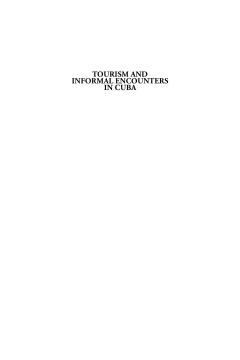
Additional Information
Book Details
Abstract
Based on a detailed ethnography, this book explores the promises and expectations of tourism in Cuba, drawing attention to the challenges that tourists and local people face in establishing meaningful connections with each other. Notions of informal encounter and relational idiom illuminate ambiguous experiences of tourism harassment, economic transactions, hospitality, friendship, and festive and sexual relationships. Comparing these various connections, the author shows the potential of touristic encounters to redefine their moral foundations, power dynamics, and implications, offering new insights into how contemporary relationships across difference and inequality are imagined and understood.
“While his work touches on themes such as migration, north/south divide, transnationalism, and the nature of socializing and social boundaries, this is primarily an anthropological study of relationships generated through tourism, featuring pithy ethnographic vignettes. Tourism and Informal Encounters in Cuba offers readers a multilayered analysis of connecting across boundaries, as visitors and hosts negotiate power, desire, fear, and hope.” • Anthropos
“Simoni's approach is innovative and still little explored in the anthropology of tourism, both in terms of content and method… With a dynamic and enjoyable narrative style, the author presents us a gallery of characters and feelings … a true human laboratory in which all the protagonists face a challenge: to find new vocabularies to define the nature of their relationships… the book is intended as a gradual journey: each chapter achieves a deeper understanding of the encounters, and "relational idioms" mutually enrich one another with meaning through convergences, contrasts and oppositions.” • Quaderns
“Simoni’s work represents a valuable contribution to a better understanding of the role of tourism in contemporary Cuban society. Particularly noteworthy is the quality of his ethnographic work.” • Mondes du Tourisme
“Well-written and accessible, the book will appeal to scholars and students in the disciplines of anthropology, Latin American/Caribbean studies, and tourism studies. It offers a unique view of the intimate negotiations between Cubans and tourists at a time when Cuba is in the spotlight with the pending opening to the U.S. market.” • Journal of Latin American and Caribbean Anthropology
“This is a book that will appeal to scholars who focus on tourism as well as those who study friendship and reciprocity in relationships. For specialists, the highlight of this book is the way that Simoni synthesizes academic research on the informal economy with the phenomenology of relationship development.” • American Ethnologist
“…a truly engaging and pleasantly readable academic treatise. What emerges is a narrative that reflects common tourism experiences in a manner both intimate and philosophically revealing while crafted so that his protagonists are never exposed or ridiculed… this remains the outstanding strength of this contribution as well as the broader research it draws on: opening rather than closing debates and leaving space to be surprised: thus Simoni, as a tourist researcher, actually manages to be a seasoned traveller while joyfully riding the ambiguities this entails. The book is witness to the productivity of such a skill. Researchers of tourism and mobilities will benefit greatly from this book.” • Journal of Tourism and Cultural Change
“The book is very exciting and I look forward to the waves it will make in the Anthropology of Tourism, since it takes us beyond old debates about lines in the sand between tourists and hosts. Simoni nicely articulates… that there are multiple desiring agents at work in Cuban tourism and it isn’t so cut and dry as ‘us’ and ‘them’.” • L. Kaifa Roland, University of Colorado
“This is an important work on the ambivalence of encounters with a priori strangers in the field of tourism, an aspect of social life that has been neglected in recent anthropological literature on tourism and in general, which often remains schematic and categorical.” • David Picard
Valerio Simoni is Senior Research Fellow at the Department of Anthropology and Sociology, The Graduate Institute, Geneva. His work, grounded in ethnographic research in Cuba and Spain, focuses on the transformation of intimacy, morality, and economic practice in international tourism and migration.
Table of Contents
| Section Title | Page | Action | Price |
|---|---|---|---|
| Title Page | iii | ||
| Table of Contents | vii | ||
| List of Illustrations | viii | ||
| Foreword | ix | ||
| Acknowledgements | xiii | ||
| Introduction. Relating Through Tourism | 1 | ||
| Part One. Achieving Encounters | 31 | ||
| Chapter 1. Tourism in Cuba | 33 | ||
| Chapter 2. Shaping Expectations | 50 | ||
| Chapter 3. Gaining Access | 66 | ||
| Chapter 4. Getting in Touch | 87 | ||
| Part Two. Shaping Relations | 105 | ||
| Chapter 5. Market Exchange and Hospitality | 107 | ||
| Chapter 6. Friendliness and Friendship | 126 | ||
| Chapter 7. Partying and Seducing | 149 | ||
| Chapter 8. Seduction and Commoditized Sex | 165 | ||
| Conclusion. Treasuring Fragile Relations | 193 | ||
| Endnotes | 215 | ||
| References | 239 | ||
| Index | 257 |
